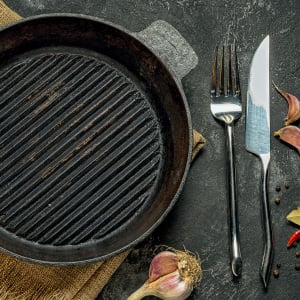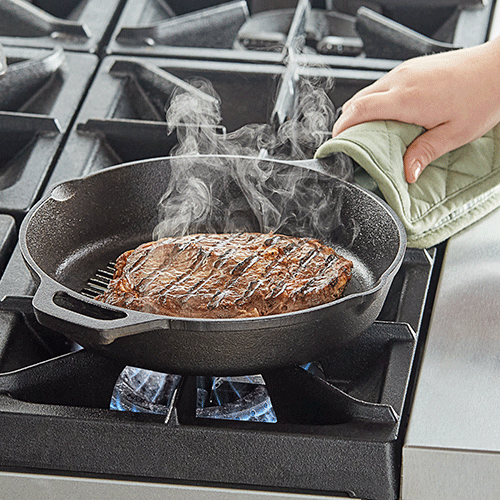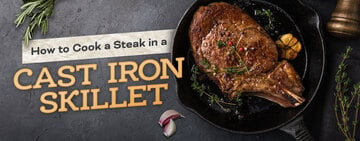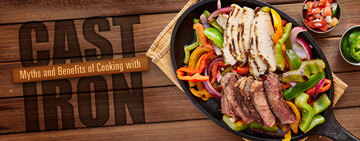

Whether it’s been passed down through generations or just recently purchased, a cast iron grill pan is a vital tool to have in your kitchen. But once service is over, do you know how to properly clean your cast iron grill pan? With the right care, these pans can outlast even your most durable non-stick or stainless steel pans. After cooking with cast iron, follow these steps on how to clean and season a cast iron skillet to ensure your sturdy cast iron stays a staple in your commercial kitchen.
Check out our tutorial for a visual demonstration on cleaning a cast iron grill pan:
Below are the best ways to clean a cast-iron pan after cooking:

Because maintaining your cast iron’s seasoned surface is important, it makes sense why many chefs reach for kosher salt instead of detergent when cleaning. The coarseness of kosher salt offers an abrasive cleaning solution that helps rid your pan of stuck-on particles. Often considered the best way to clean a cast-iron skillet, here’s how to use salt and water to effectively scrub your pan.
If you’re a firm believer in keeping your cast iron far away from water, this method may be perfect for you. It offers the same abrasive scrubbing as the method above, which makes it effective for combating stuck-on food.
Just as your cast iron has been passed down over the years, so has the idea that you should never use soap with it. When done right, however, soap and water can be an effective method for removing rust or cleaning brand-new cast iron. Because this method can break down and remove the flavor-enhancing seasoning you’ve built up over multiple uses, it is recommended you use the following method only when necessary.
If you’re short on supplies or your pan contains a lot of large food particles, this simple method may work best for you.
Note: this method will only work with grill pans that have tall sides to contain the water.

What you do after cleaning your cast iron skillet will determine how long it lasts in your kitchen. Because cast iron is especially susceptible to rust, you must make sure it is bone dry before storage.
The best oil to use for seasoning cast iron is a high smoke point oil, such as canola, vegetable, grapeseed, and even lard. These oils are also inexpensive and have a mild taste, so they shouldn't affect the flavor of your cooking.
Using flaxseed oil to season a cast iron skillet is a hotly debated topic. It is a great drying oil and can leave a nice, sturdy polymer network chain which creates a harder and smoother surface on your cast iron pan. However, many flaxseed oil users have reported that flaxseed oil can flake off after use. Another downside is that flaxseed oil is expensive, and you will need many coats of this oil to fully season the cast iron pan.
No matter what method you use to clean a cast iron grill pan, here are a few tips for increasing the life of your cast iron:
No matter what method you think is best to clean a cast iron grill pan, be sure to stay consistent and diligent with your after-cooking care. When cast iron pans are well preserved, they only get better with age. Build up years of flavor-enhancing seasoning to produce delicious food guests will come back to time and time again.
The information provided on this website does not, and is not intended to, constitute legal advice. Please refer to our Content Policy for more details.

How to Cook Steak in a Cast Iron Skillet
Cooking premier cuts of steak in a cast iron skillet offers several advantages. Cast iron distributes heat evenly across its surface and retains heat

Outdoor Cooking Equipment Buying Guide
One of the most enjoyable parts of summer is taking advantage of the warm weather and cooking outside. Grilling burgers, smoking ribs, or even cooking

Myths and Benefits of Cooking with Cast Iron
When you think of cast iron cookware, you probably picture a campfire. Maybe some cowboys out on the range, sizzling up some steaks while swapping tal